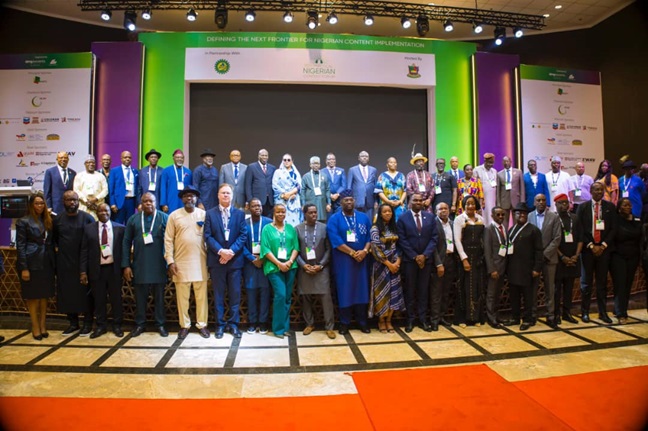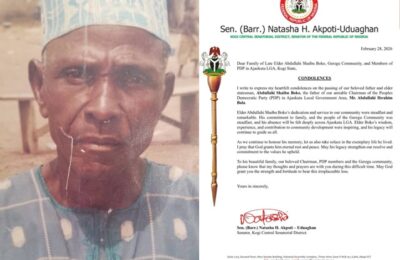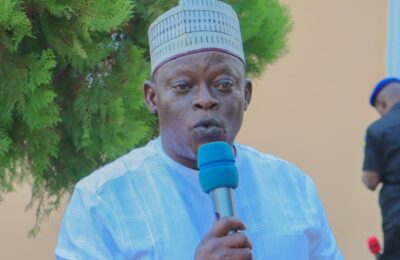Senator Natasha Akpoti-Uduaghan, Chairman of the Senate Committee on Local Content, has emphasized the need to redefine Nigerian content to drive national development.
Speaking at the 13th Annual Practical Nigerian Content (PNC) forum, she stressed that Nigeria must look beyond capacity building to unlock its full potential and claim its place on the global stage.
According to Senator Akpoti-Uduaghan, Nigerian content implementation must encompass innovation, sustainability, collaboration, and market expansion to drive a holistic transformation across sectors.
“For decades, Nigerian content has been synonymous with the development of local capacity in the Oil and Gas sector. We’ve emphasised skills acquisition, education, and infrastructure development, and rightly so. These efforts have laid a solid foundation. However, to unlock Nigeria’s full potential and claim our place on the global stage, we must now look beyond capacity building.

“Today, I invite us to broaden our perspective and consider how Nigerian content implementation can encompass innovation, sustainability, collaboration, and market expansion to drive a holistic transformation across sectors,” she said.
She also disclosed that the Nigerian National Petroleum Company Limited is set to establish five mini-liquefied natural gas plants in Ajaokuta Local Government Area of Kogi.
The Kogi lawmaker said the projects would be flagged off next year, describing it as the largest concentration of such projects in one district.
“I would like to appreciate NNPC and the industry experts who have also considered and humbled us at Ajaokuta Local Government, with the (not too sure if it’s too early to speak about it), establishment of five mini LNG plants which will be flagged off early next year. And this is actually the largest concentration of such projects in one district in the entire country. Five, not one, two, three, four, but five mini LNG plants will be established in Ajaokuta by God’s grace next year (2025).
“That’s good news for us, good news for Nigeria. So what does that mean? This and many others are just pivotal, it’s important to know that if there’s any place in the country where we should situate a technology hub that will not only drive innovations but talk about the testing and brainstorming around the various kinds of metals and what these metals can do for the industry. It’s just Ajaokuta Local Government,“ she stated.
She stressed that for every deep water operation, rigs are utilised and the cheapest rig stands at about $10m while some go as much as $25m.
“And what actually makes up a rig? Steel. So, just imagine, count how many rigs you have in Nigerian waters. Imagine if we had those rigs manufactured in-country. That means we would have saved so much money and we would have created so many jobs,” she said.
Senator Akpoti-Uduaghan, however, proposed a comprehensive framework for national development, focusing on creating value, achieving self-reliance, and establishing a legacy of global competitiveness.
“Let’s redefine Nigerian content as more than just the transfer of skills and the localisation of supply chains in the Oil and Gas sector. Instead, we must view it as a comprehensive framework for national development. Nigerian content should focus on creating value, achieving self-reliance, and establishing a legacy of global competitiveness.
“Nigeria’s challenges — ranging from unemployment to dependence on foreign technology and underutilised resources—demand a more dynamic approach. To pave this new frontier, I propose we focus on four core areas: Policy Refinement and Strategic Enforcement, Building Competitive Ecosystems, Value Chain Optimisation, Global Market Integration and Policy Refinement and Strategic Enforcement.
“We have strong policies like the Nigerian Oil and Gas Industry Content Development (NOGICD) Act and the Petroleum Industry PIA but how do we ensure these policies evolve to meet the demands of a fast-changing global economy?
“Earlier this year, one of the largest syringe factories in Africa shut down in Nigeria largely because of raw materials — Polypropylene.
“Polypropylene is the primary raw material required in the production of syringe and I don’t think we have enough companies here producing it.
“Refining Regulations: Nigerian content laws must extend beyond oil and gas. We need robust frameworks for ICT, renewable energy, healthcare to ensure indigenous participation in these critical sectors. AI, Robotics driving operations in the Energy sector
“Strategic Incentives: Introduce incentives that reward local firms for innovation, sustainability, and global competitiveness. For example, tax breaks for firms producing export-ready goods or using green technologies.
“Enforcement Mechanisms: We must leverage technology for real-time monitoring of compliance. Digital platforms can ensure transparent reporting, tracking, and penalisation of non-compliance.
“Building competitive ecosystems, capacity building is vital, but we must also create an environment where local enterprises can thrive and outcompete foreign counterparts.
“Beyond skill transfer, Nigerian firms need access to cutting-edge technologies to compete globally. Partnering with global tech hubs and ensuring robust intellectual property protections will attract high-tech investments.
“Infrastructural Synergy. We need to develop industrial clusters that integrate research, manufacturing, and export facilities. For example, creating dedicated zones for agro-processing, tech startups, or manufacturing hubs can reduce costs and foster collaboration. Speak about Ajaokuta, NOGAPS, Mini LNG plants, and AKK
“Innovation Hubs: Encourage private-public partnerships to establish innovation hubs where young Nigerians can develop and commercialise solutions tailored to our economy’s needs,” she said.
Senator Natasha also called for value chain optimisation.
“Nigerian content must prioritize optimising value chains to keep more wealth within the country.
“Local Manufacturing: We must move beyond raw material exportation and invest in industries that process our abundant resources. For example, instead of exporting crude oil, we should focus on refining petroleum products domestically and producing petrochemicals.
“Service Localisation: High-value services like engineering, project management, and consultancy are often outsourced. Incentivising Nigerian firms to provide these services will enhance expertise and retain wealth locally.
“Finally, Nigerian content implementation must extend its scope beyond domestic markets to embrace the global economy. Mention Africa Energy Bank by African Petroleum Producers Organisation.
“Export-Driven Focus: Local enterprises must be positioned to compete in international markets. The government can facilitate this by reducing export bottlenecks and providing grants for market research and international certifications.
“Brand Nigeria: We must invest in branding and marketing our goods and services to the world. Just as ‘Made in China’ evolved into a global standard, “Made in Nigeria” can become synonymous with quality and innovation.
“Regional Leadership: Nigeria should take the lead in African trade through the African Continental Free Trade Area (AfCFTA). Promoting intra-African trade will strengthen our regional influence and provide a stepping stone to global markets.
“Ladies and gentlemen, this vision is not utopian. Our national players like WalterSmith of Renaissance Africa and Oando are strategically repositioning ownership of assets. Dangote refinery leads in-country production of refined crude products.
“Let’s speak global, countries like Malaysia, South Korea, and Brazil have successfully localized content and leveraged it for national transformation. For example: Malaysia’s PETRONAS became a global player by systematically developing its local energy sector and exporting expertise. Also, South Korea transformed its economy by prioritising local industries, resulting in globally competitive brands like Samsung and Hyundai.
“Nigeria can learn from these examples and tailor their strategies to our unique strengths and challenges.
“As we expand the scope of Nigerian content, sustainability must be at the core. Environmental, Social, and Governance (ESG) principles should guide every decision. This includes: Adopting green technologies to reduce our carbon footprint; Ensuring social inclusivity by empowering women, youth, and marginalized communities; Promoting ethical practices and transparency in all sectors.
“Distinguished ladies and gentlemen, paving a new frontier for Nigerian content implementation requires collective will, strategic vision, and bold actions. We must embrace a mindset that moves beyond compliance and capacity building to innovation, competitiveness, and global relevance.
“As policymakers, industry leaders, and citizens, we each have a role to play. Let us envision a Nigeria where: Our industries lead not just locally but globally, Our youths innovate solutions that shape the future, Our resources create wealth for generations to come.
“The journey ahead will not be easy, but it is necessary. If we act decisively today, the rewards will echo across history. Let us rise to this challenge and ensure that Nigerian content becomes not just a policy but a legacy,” she opined.




